Tax Law Report: Black Economy, Sharing Economy, and Tax Consequences
VerifiedAdded on 2020/10/04
|9
|2642
|33
Report
AI Summary
This report delves into the complexities of the black economy and the sharing economy within the Australian context. It begins by defining the black economy, highlighting its detrimental impacts, and contrasts it with the sharing economy, outlining its operational characteristics. The report then analyzes two contrasting business models: Food by us, which operates within the sharing economy, and Liquorice Gourmet Food, which uses a traditional business model. It examines their operational structures and the tax consequences they face under Australian tax law, including reporting, deductions, and estimated tax payments. Furthermore, the report explores the Australian government's initiatives, as detailed in the Black Economy Taskforce interim report, focusing on strategies to combat illegal activities and promote economic stability. The report concludes by summarizing the key findings, emphasizing the importance of addressing the challenges posed by the black economy and the evolving landscape of the sharing economy in Australia.
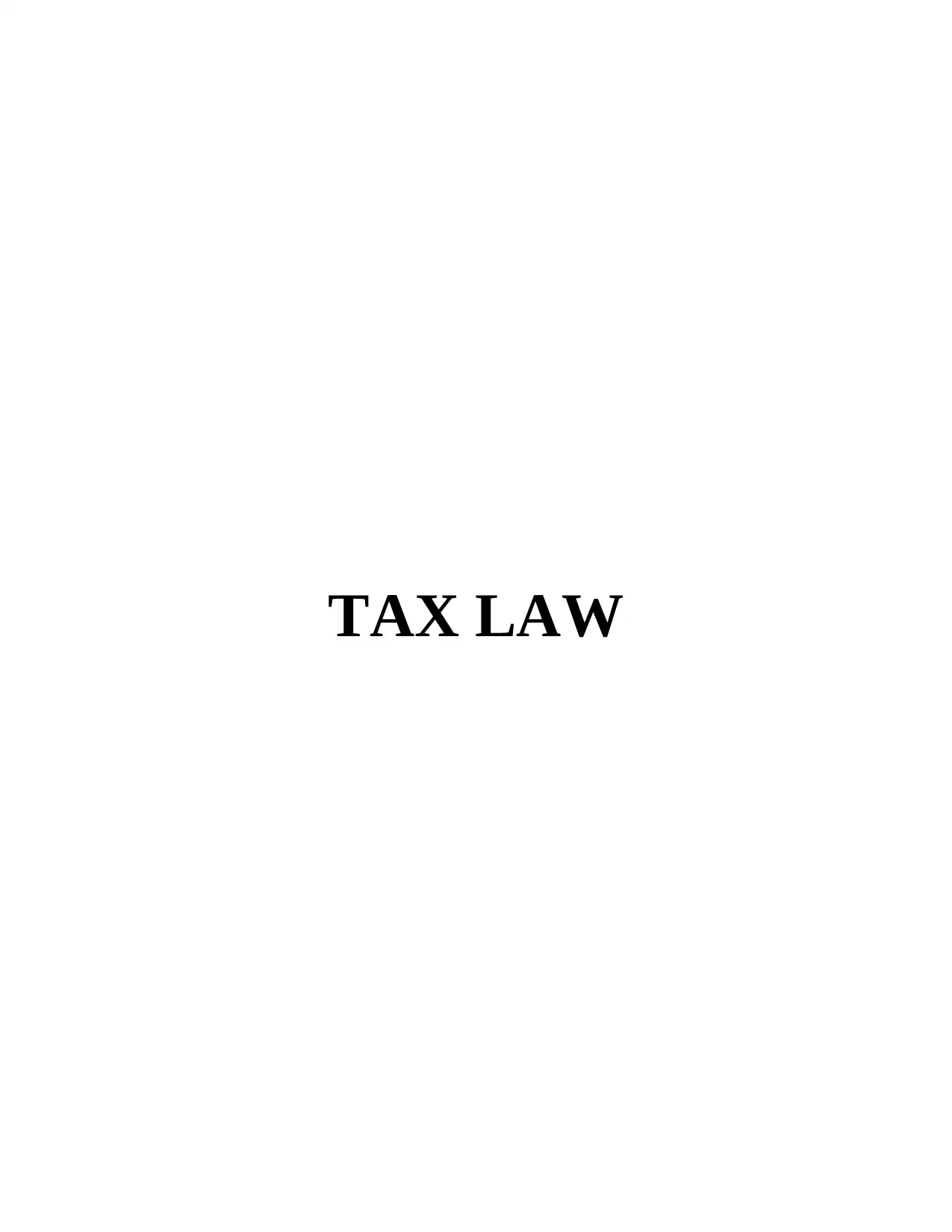
TAX LAW
Paraphrase This Document
Need a fresh take? Get an instant paraphrase of this document with our AI Paraphraser
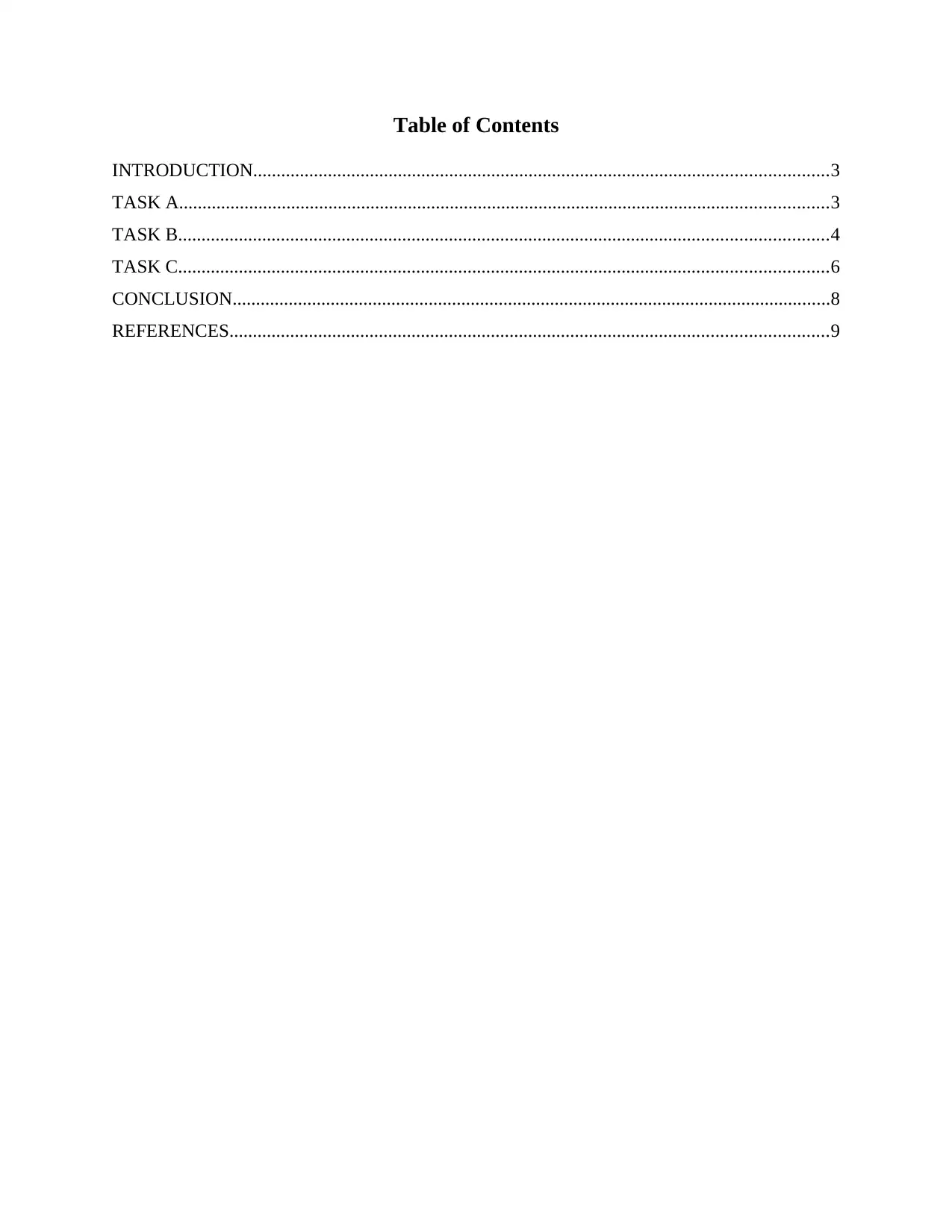
Table of Contents
INTRODUCTION...........................................................................................................................3
TASK A...........................................................................................................................................3
TASK B...........................................................................................................................................4
TASK C...........................................................................................................................................6
CONCLUSION................................................................................................................................8
REFERENCES................................................................................................................................9
INTRODUCTION...........................................................................................................................3
TASK A...........................................................................................................................................3
TASK B...........................................................................................................................................4
TASK C...........................................................................................................................................6
CONCLUSION................................................................................................................................8
REFERENCES................................................................................................................................9
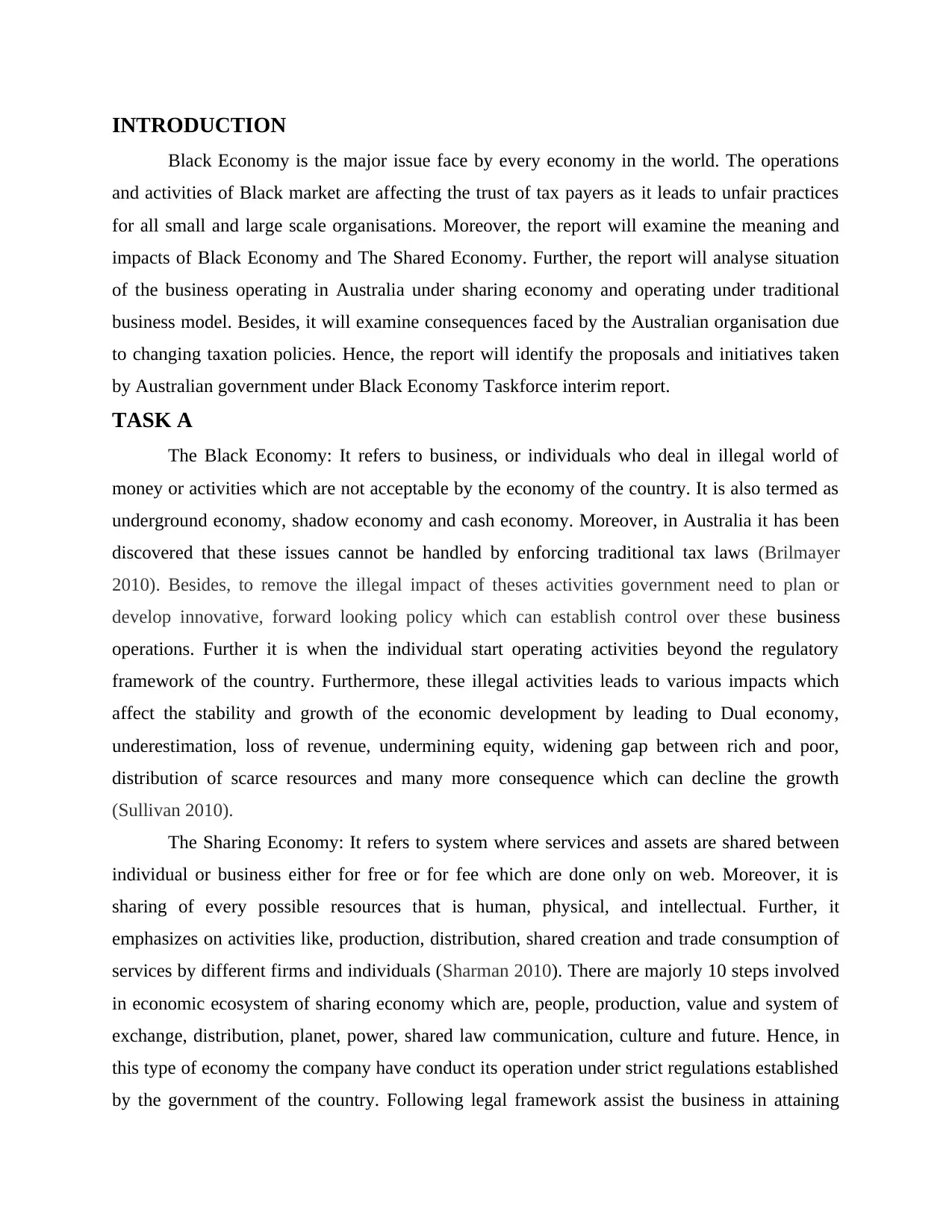
INTRODUCTION
Black Economy is the major issue face by every economy in the world. The operations
and activities of Black market are affecting the trust of tax payers as it leads to unfair practices
for all small and large scale organisations. Moreover, the report will examine the meaning and
impacts of Black Economy and The Shared Economy. Further, the report will analyse situation
of the business operating in Australia under sharing economy and operating under traditional
business model. Besides, it will examine consequences faced by the Australian organisation due
to changing taxation policies. Hence, the report will identify the proposals and initiatives taken
by Australian government under Black Economy Taskforce interim report.
TASK A
The Black Economy: It refers to business, or individuals who deal in illegal world of
money or activities which are not acceptable by the economy of the country. It is also termed as
underground economy, shadow economy and cash economy. Moreover, in Australia it has been
discovered that these issues cannot be handled by enforcing traditional tax laws (Brilmayer
2010). Besides, to remove the illegal impact of theses activities government need to plan or
develop innovative, forward looking policy which can establish control over these business
operations. Further it is when the individual start operating activities beyond the regulatory
framework of the country. Furthermore, these illegal activities leads to various impacts which
affect the stability and growth of the economic development by leading to Dual economy,
underestimation, loss of revenue, undermining equity, widening gap between rich and poor,
distribution of scarce resources and many more consequence which can decline the growth
(Sullivan 2010).
The Sharing Economy: It refers to system where services and assets are shared between
individual or business either for free or for fee which are done only on web. Moreover, it is
sharing of every possible resources that is human, physical, and intellectual. Further, it
emphasizes on activities like, production, distribution, shared creation and trade consumption of
services by different firms and individuals (Sharman 2010). There are majorly 10 steps involved
in economic ecosystem of sharing economy which are, people, production, value and system of
exchange, distribution, planet, power, shared law communication, culture and future. Hence, in
this type of economy the company have conduct its operation under strict regulations established
by the government of the country. Following legal framework assist the business in attaining
Black Economy is the major issue face by every economy in the world. The operations
and activities of Black market are affecting the trust of tax payers as it leads to unfair practices
for all small and large scale organisations. Moreover, the report will examine the meaning and
impacts of Black Economy and The Shared Economy. Further, the report will analyse situation
of the business operating in Australia under sharing economy and operating under traditional
business model. Besides, it will examine consequences faced by the Australian organisation due
to changing taxation policies. Hence, the report will identify the proposals and initiatives taken
by Australian government under Black Economy Taskforce interim report.
TASK A
The Black Economy: It refers to business, or individuals who deal in illegal world of
money or activities which are not acceptable by the economy of the country. It is also termed as
underground economy, shadow economy and cash economy. Moreover, in Australia it has been
discovered that these issues cannot be handled by enforcing traditional tax laws (Brilmayer
2010). Besides, to remove the illegal impact of theses activities government need to plan or
develop innovative, forward looking policy which can establish control over these business
operations. Further it is when the individual start operating activities beyond the regulatory
framework of the country. Furthermore, these illegal activities leads to various impacts which
affect the stability and growth of the economic development by leading to Dual economy,
underestimation, loss of revenue, undermining equity, widening gap between rich and poor,
distribution of scarce resources and many more consequence which can decline the growth
(Sullivan 2010).
The Sharing Economy: It refers to system where services and assets are shared between
individual or business either for free or for fee which are done only on web. Moreover, it is
sharing of every possible resources that is human, physical, and intellectual. Further, it
emphasizes on activities like, production, distribution, shared creation and trade consumption of
services by different firms and individuals (Sharman 2010). There are majorly 10 steps involved
in economic ecosystem of sharing economy which are, people, production, value and system of
exchange, distribution, planet, power, shared law communication, culture and future. Hence, in
this type of economy the company have conduct its operation under strict regulations established
by the government of the country. Following legal framework assist the business in attaining
⊘ This is a preview!⊘
Do you want full access?
Subscribe today to unlock all pages.

Trusted by 1+ million students worldwide
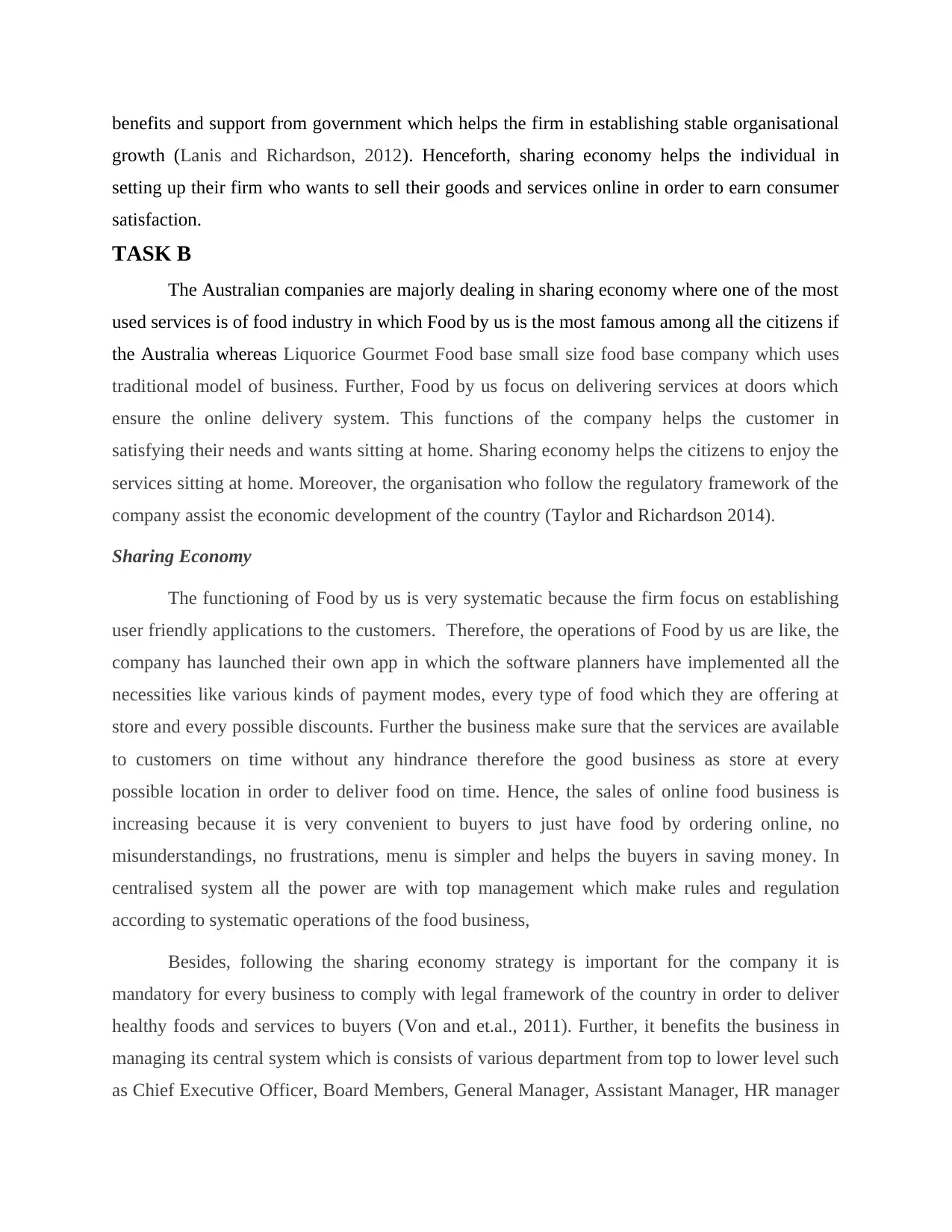
benefits and support from government which helps the firm in establishing stable organisational
growth (Lanis and Richardson, 2012). Henceforth, sharing economy helps the individual in
setting up their firm who wants to sell their goods and services online in order to earn consumer
satisfaction.
TASK B
The Australian companies are majorly dealing in sharing economy where one of the most
used services is of food industry in which Food by us is the most famous among all the citizens if
the Australia whereas Liquorice Gourmet Food base small size food base company which uses
traditional model of business. Further, Food by us focus on delivering services at doors which
ensure the online delivery system. This functions of the company helps the customer in
satisfying their needs and wants sitting at home. Sharing economy helps the citizens to enjoy the
services sitting at home. Moreover, the organisation who follow the regulatory framework of the
company assist the economic development of the country (Taylor and Richardson 2014).
Sharing Economy
The functioning of Food by us is very systematic because the firm focus on establishing
user friendly applications to the customers. Therefore, the operations of Food by us are like, the
company has launched their own app in which the software planners have implemented all the
necessities like various kinds of payment modes, every type of food which they are offering at
store and every possible discounts. Further the business make sure that the services are available
to customers on time without any hindrance therefore the good business as store at every
possible location in order to deliver food on time. Hence, the sales of online food business is
increasing because it is very convenient to buyers to just have food by ordering online, no
misunderstandings, no frustrations, menu is simpler and helps the buyers in saving money. In
centralised system all the power are with top management which make rules and regulation
according to systematic operations of the food business,
Besides, following the sharing economy strategy is important for the company it is
mandatory for every business to comply with legal framework of the country in order to deliver
healthy foods and services to buyers (Von and et.al., 2011). Further, it benefits the business in
managing its central system which is consists of various department from top to lower level such
as Chief Executive Officer, Board Members, General Manager, Assistant Manager, HR manager
growth (Lanis and Richardson, 2012). Henceforth, sharing economy helps the individual in
setting up their firm who wants to sell their goods and services online in order to earn consumer
satisfaction.
TASK B
The Australian companies are majorly dealing in sharing economy where one of the most
used services is of food industry in which Food by us is the most famous among all the citizens if
the Australia whereas Liquorice Gourmet Food base small size food base company which uses
traditional model of business. Further, Food by us focus on delivering services at doors which
ensure the online delivery system. This functions of the company helps the customer in
satisfying their needs and wants sitting at home. Sharing economy helps the citizens to enjoy the
services sitting at home. Moreover, the organisation who follow the regulatory framework of the
company assist the economic development of the country (Taylor and Richardson 2014).
Sharing Economy
The functioning of Food by us is very systematic because the firm focus on establishing
user friendly applications to the customers. Therefore, the operations of Food by us are like, the
company has launched their own app in which the software planners have implemented all the
necessities like various kinds of payment modes, every type of food which they are offering at
store and every possible discounts. Further the business make sure that the services are available
to customers on time without any hindrance therefore the good business as store at every
possible location in order to deliver food on time. Hence, the sales of online food business is
increasing because it is very convenient to buyers to just have food by ordering online, no
misunderstandings, no frustrations, menu is simpler and helps the buyers in saving money. In
centralised system all the power are with top management which make rules and regulation
according to systematic operations of the food business,
Besides, following the sharing economy strategy is important for the company it is
mandatory for every business to comply with legal framework of the country in order to deliver
healthy foods and services to buyers (Von and et.al., 2011). Further, it benefits the business in
managing its central system which is consists of various department from top to lower level such
as Chief Executive Officer, Board Members, General Manager, Assistant Manager, HR manager
Paraphrase This Document
Need a fresh take? Get an instant paraphrase of this document with our AI Paraphraser
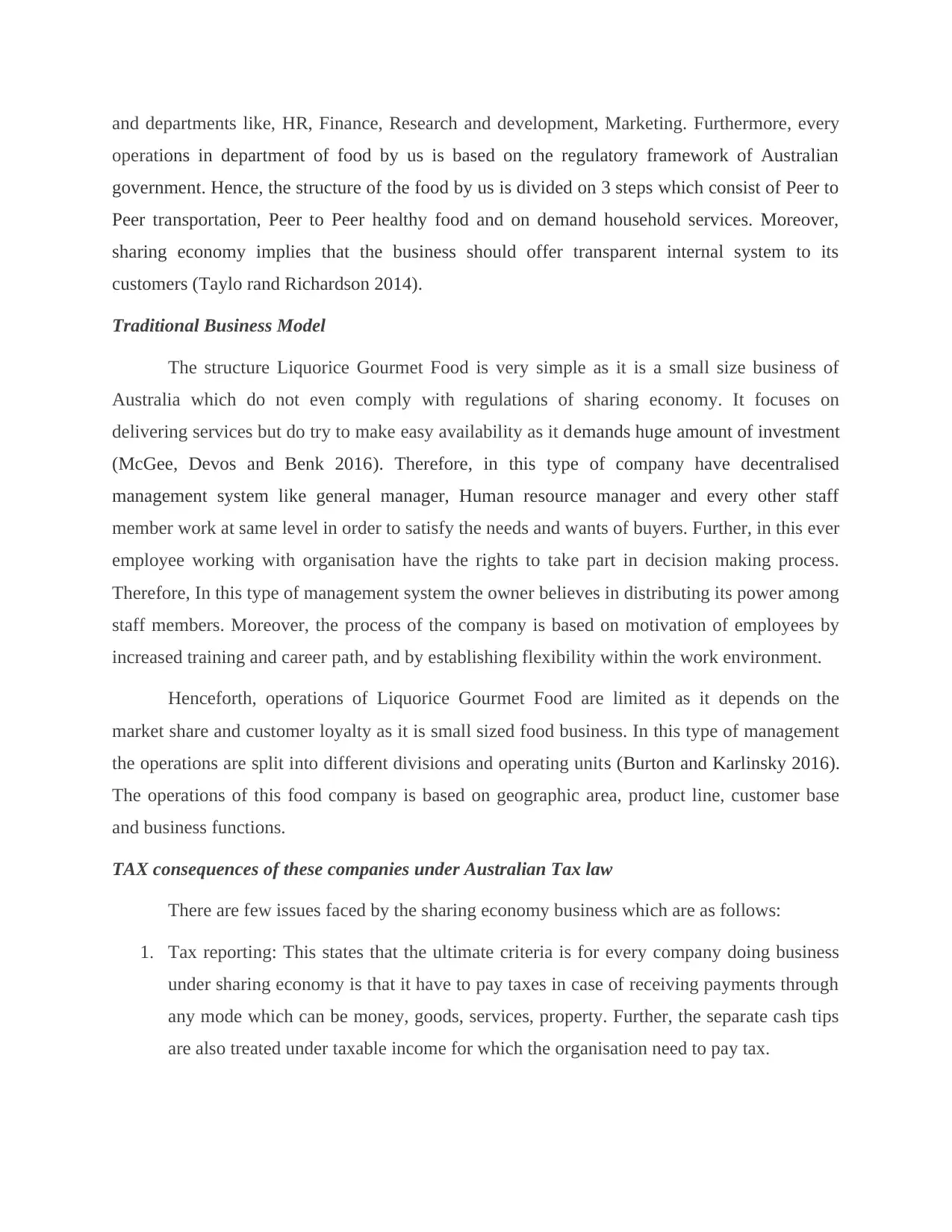
and departments like, HR, Finance, Research and development, Marketing. Furthermore, every
operations in department of food by us is based on the regulatory framework of Australian
government. Hence, the structure of the food by us is divided on 3 steps which consist of Peer to
Peer transportation, Peer to Peer healthy food and on demand household services. Moreover,
sharing economy implies that the business should offer transparent internal system to its
customers (Taylo rand Richardson 2014).
Traditional Business Model
The structure Liquorice Gourmet Food is very simple as it is a small size business of
Australia which do not even comply with regulations of sharing economy. It focuses on
delivering services but do try to make easy availability as it demands huge amount of investment
(McGee, Devos and Benk 2016). Therefore, in this type of company have decentralised
management system like general manager, Human resource manager and every other staff
member work at same level in order to satisfy the needs and wants of buyers. Further, in this ever
employee working with organisation have the rights to take part in decision making process.
Therefore, In this type of management system the owner believes in distributing its power among
staff members. Moreover, the process of the company is based on motivation of employees by
increased training and career path, and by establishing flexibility within the work environment.
Henceforth, operations of Liquorice Gourmet Food are limited as it depends on the
market share and customer loyalty as it is small sized food business. In this type of management
the operations are split into different divisions and operating units (Burton and Karlinsky 2016).
The operations of this food company is based on geographic area, product line, customer base
and business functions.
TAX consequences of these companies under Australian Tax law
There are few issues faced by the sharing economy business which are as follows:
1. Tax reporting: This states that the ultimate criteria is for every company doing business
under sharing economy is that it have to pay taxes in case of receiving payments through
any mode which can be money, goods, services, property. Further, the separate cash tips
are also treated under taxable income for which the organisation need to pay tax.
operations in department of food by us is based on the regulatory framework of Australian
government. Hence, the structure of the food by us is divided on 3 steps which consist of Peer to
Peer transportation, Peer to Peer healthy food and on demand household services. Moreover,
sharing economy implies that the business should offer transparent internal system to its
customers (Taylo rand Richardson 2014).
Traditional Business Model
The structure Liquorice Gourmet Food is very simple as it is a small size business of
Australia which do not even comply with regulations of sharing economy. It focuses on
delivering services but do try to make easy availability as it demands huge amount of investment
(McGee, Devos and Benk 2016). Therefore, in this type of company have decentralised
management system like general manager, Human resource manager and every other staff
member work at same level in order to satisfy the needs and wants of buyers. Further, in this ever
employee working with organisation have the rights to take part in decision making process.
Therefore, In this type of management system the owner believes in distributing its power among
staff members. Moreover, the process of the company is based on motivation of employees by
increased training and career path, and by establishing flexibility within the work environment.
Henceforth, operations of Liquorice Gourmet Food are limited as it depends on the
market share and customer loyalty as it is small sized food business. In this type of management
the operations are split into different divisions and operating units (Burton and Karlinsky 2016).
The operations of this food company is based on geographic area, product line, customer base
and business functions.
TAX consequences of these companies under Australian Tax law
There are few issues faced by the sharing economy business which are as follows:
1. Tax reporting: This states that the ultimate criteria is for every company doing business
under sharing economy is that it have to pay taxes in case of receiving payments through
any mode which can be money, goods, services, property. Further, the separate cash tips
are also treated under taxable income for which the organisation need to pay tax.
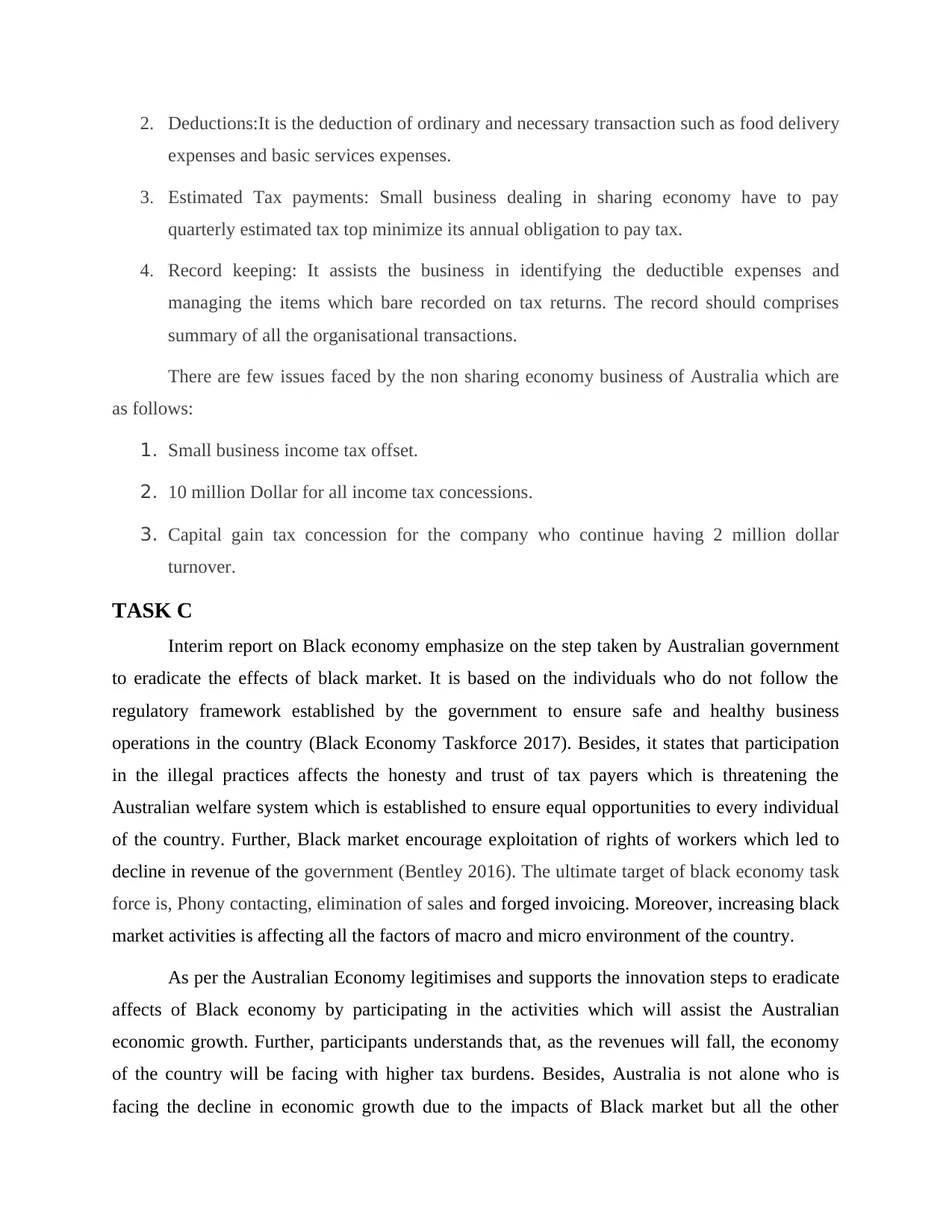
2. Deductions:It is the deduction of ordinary and necessary transaction such as food delivery
expenses and basic services expenses.
3. Estimated Tax payments: Small business dealing in sharing economy have to pay
quarterly estimated tax top minimize its annual obligation to pay tax.
4. Record keeping: It assists the business in identifying the deductible expenses and
managing the items which bare recorded on tax returns. The record should comprises
summary of all the organisational transactions.
There are few issues faced by the non sharing economy business of Australia which are
as follows:
1. Small business income tax offset.
2. 10 million Dollar for all income tax concessions.
3. Capital gain tax concession for the company who continue having 2 million dollar
turnover.
TASK C
Interim report on Black economy emphasize on the step taken by Australian government
to eradicate the effects of black market. It is based on the individuals who do not follow the
regulatory framework established by the government to ensure safe and healthy business
operations in the country (Black Economy Taskforce 2017). Besides, it states that participation
in the illegal practices affects the honesty and trust of tax payers which is threatening the
Australian welfare system which is established to ensure equal opportunities to every individual
of the country. Further, Black market encourage exploitation of rights of workers which led to
decline in revenue of the government (Bentley 2016). The ultimate target of black economy task
force is, Phony contacting, elimination of sales and forged invoicing. Moreover, increasing black
market activities is affecting all the factors of macro and micro environment of the country.
As per the Australian Economy legitimises and supports the innovation steps to eradicate
affects of Black economy by participating in the activities which will assist the Australian
economic growth. Further, participants understands that, as the revenues will fall, the economy
of the country will be facing with higher tax burdens. Besides, Australia is not alone who is
facing the decline in economic growth due to the impacts of Black market but all the other
expenses and basic services expenses.
3. Estimated Tax payments: Small business dealing in sharing economy have to pay
quarterly estimated tax top minimize its annual obligation to pay tax.
4. Record keeping: It assists the business in identifying the deductible expenses and
managing the items which bare recorded on tax returns. The record should comprises
summary of all the organisational transactions.
There are few issues faced by the non sharing economy business of Australia which are
as follows:
1. Small business income tax offset.
2. 10 million Dollar for all income tax concessions.
3. Capital gain tax concession for the company who continue having 2 million dollar
turnover.
TASK C
Interim report on Black economy emphasize on the step taken by Australian government
to eradicate the effects of black market. It is based on the individuals who do not follow the
regulatory framework established by the government to ensure safe and healthy business
operations in the country (Black Economy Taskforce 2017). Besides, it states that participation
in the illegal practices affects the honesty and trust of tax payers which is threatening the
Australian welfare system which is established to ensure equal opportunities to every individual
of the country. Further, Black market encourage exploitation of rights of workers which led to
decline in revenue of the government (Bentley 2016). The ultimate target of black economy task
force is, Phony contacting, elimination of sales and forged invoicing. Moreover, increasing black
market activities is affecting all the factors of macro and micro environment of the country.
As per the Australian Economy legitimises and supports the innovation steps to eradicate
affects of Black economy by participating in the activities which will assist the Australian
economic growth. Further, participants understands that, as the revenues will fall, the economy
of the country will be facing with higher tax burdens. Besides, Australia is not alone who is
facing the decline in economic growth due to the impacts of Black market but all the other
⊘ This is a preview!⊘
Do you want full access?
Subscribe today to unlock all pages.

Trusted by 1+ million students worldwide
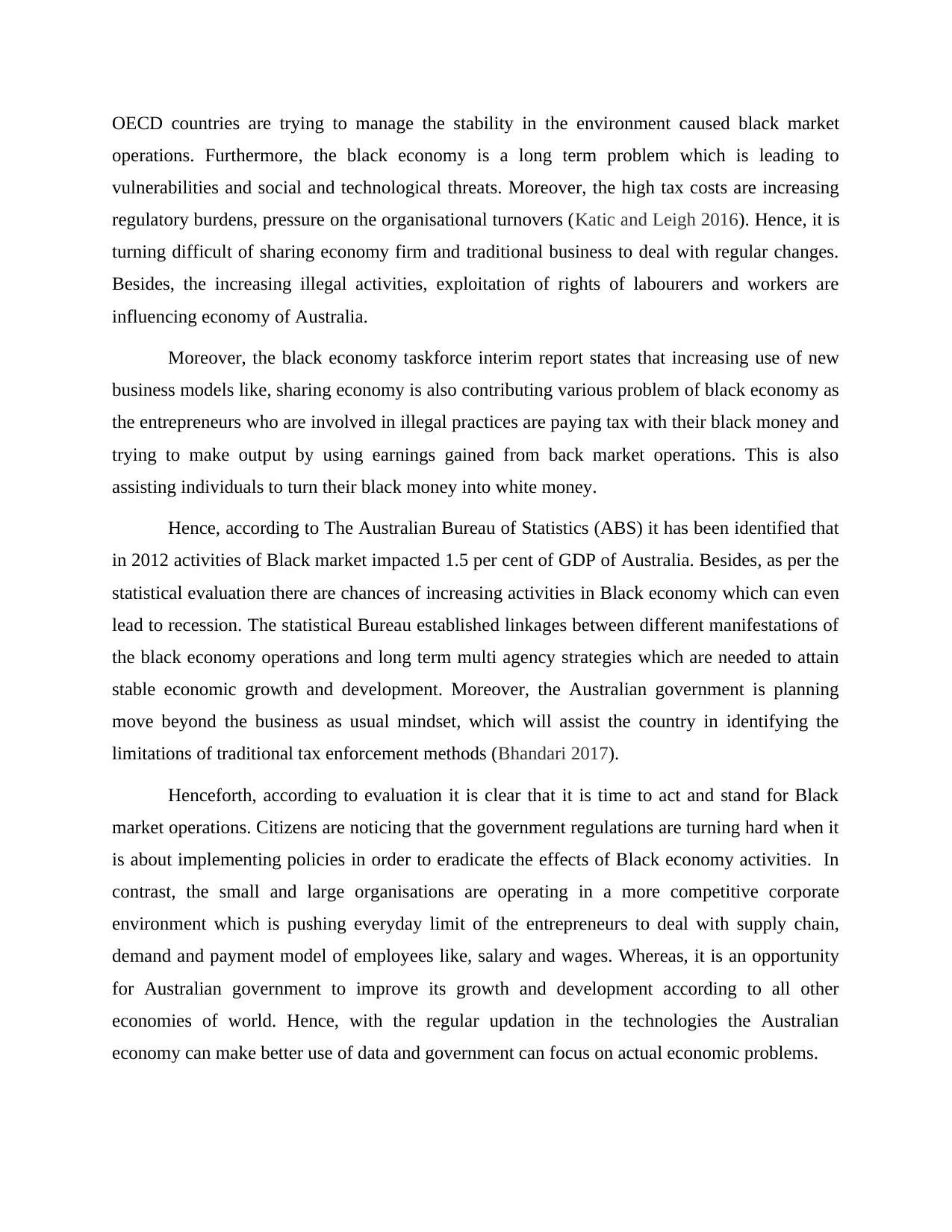
OECD countries are trying to manage the stability in the environment caused black market
operations. Furthermore, the black economy is a long term problem which is leading to
vulnerabilities and social and technological threats. Moreover, the high tax costs are increasing
regulatory burdens, pressure on the organisational turnovers (Katic and Leigh 2016). Hence, it is
turning difficult of sharing economy firm and traditional business to deal with regular changes.
Besides, the increasing illegal activities, exploitation of rights of labourers and workers are
influencing economy of Australia.
Moreover, the black economy taskforce interim report states that increasing use of new
business models like, sharing economy is also contributing various problem of black economy as
the entrepreneurs who are involved in illegal practices are paying tax with their black money and
trying to make output by using earnings gained from back market operations. This is also
assisting individuals to turn their black money into white money.
Hence, according to The Australian Bureau of Statistics (ABS) it has been identified that
in 2012 activities of Black market impacted 1.5 per cent of GDP of Australia. Besides, as per the
statistical evaluation there are chances of increasing activities in Black economy which can even
lead to recession. The statistical Bureau established linkages between different manifestations of
the black economy operations and long term multi agency strategies which are needed to attain
stable economic growth and development. Moreover, the Australian government is planning
move beyond the business as usual mindset, which will assist the country in identifying the
limitations of traditional tax enforcement methods (Bhandari 2017).
Henceforth, according to evaluation it is clear that it is time to act and stand for Black
market operations. Citizens are noticing that the government regulations are turning hard when it
is about implementing policies in order to eradicate the effects of Black economy activities. In
contrast, the small and large organisations are operating in a more competitive corporate
environment which is pushing everyday limit of the entrepreneurs to deal with supply chain,
demand and payment model of employees like, salary and wages. Whereas, it is an opportunity
for Australian government to improve its growth and development according to all other
economies of world. Hence, with the regular updation in the technologies the Australian
economy can make better use of data and government can focus on actual economic problems.
operations. Furthermore, the black economy is a long term problem which is leading to
vulnerabilities and social and technological threats. Moreover, the high tax costs are increasing
regulatory burdens, pressure on the organisational turnovers (Katic and Leigh 2016). Hence, it is
turning difficult of sharing economy firm and traditional business to deal with regular changes.
Besides, the increasing illegal activities, exploitation of rights of labourers and workers are
influencing economy of Australia.
Moreover, the black economy taskforce interim report states that increasing use of new
business models like, sharing economy is also contributing various problem of black economy as
the entrepreneurs who are involved in illegal practices are paying tax with their black money and
trying to make output by using earnings gained from back market operations. This is also
assisting individuals to turn their black money into white money.
Hence, according to The Australian Bureau of Statistics (ABS) it has been identified that
in 2012 activities of Black market impacted 1.5 per cent of GDP of Australia. Besides, as per the
statistical evaluation there are chances of increasing activities in Black economy which can even
lead to recession. The statistical Bureau established linkages between different manifestations of
the black economy operations and long term multi agency strategies which are needed to attain
stable economic growth and development. Moreover, the Australian government is planning
move beyond the business as usual mindset, which will assist the country in identifying the
limitations of traditional tax enforcement methods (Bhandari 2017).
Henceforth, according to evaluation it is clear that it is time to act and stand for Black
market operations. Citizens are noticing that the government regulations are turning hard when it
is about implementing policies in order to eradicate the effects of Black economy activities. In
contrast, the small and large organisations are operating in a more competitive corporate
environment which is pushing everyday limit of the entrepreneurs to deal with supply chain,
demand and payment model of employees like, salary and wages. Whereas, it is an opportunity
for Australian government to improve its growth and development according to all other
economies of world. Hence, with the regular updation in the technologies the Australian
economy can make better use of data and government can focus on actual economic problems.
Paraphrase This Document
Need a fresh take? Get an instant paraphrase of this document with our AI Paraphraser
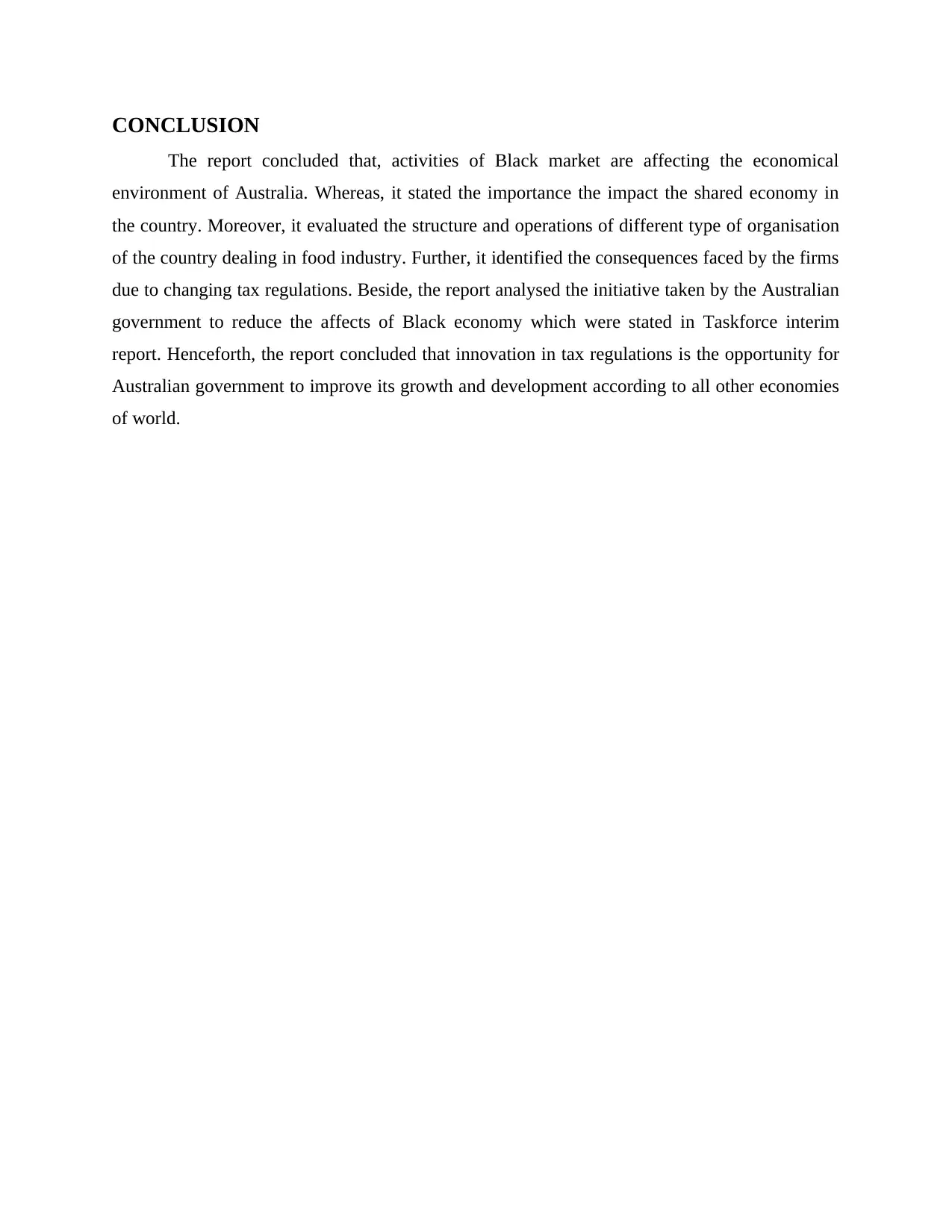
CONCLUSION
The report concluded that, activities of Black market are affecting the economical
environment of Australia. Whereas, it stated the importance the impact the shared economy in
the country. Moreover, it evaluated the structure and operations of different type of organisation
of the country dealing in food industry. Further, it identified the consequences faced by the firms
due to changing tax regulations. Beside, the report analysed the initiative taken by the Australian
government to reduce the affects of Black economy which were stated in Taskforce interim
report. Henceforth, the report concluded that innovation in tax regulations is the opportunity for
Australian government to improve its growth and development according to all other economies
of world.
The report concluded that, activities of Black market are affecting the economical
environment of Australia. Whereas, it stated the importance the impact the shared economy in
the country. Moreover, it evaluated the structure and operations of different type of organisation
of the country dealing in food industry. Further, it identified the consequences faced by the firms
due to changing tax regulations. Beside, the report analysed the initiative taken by the Australian
government to reduce the affects of Black economy which were stated in Taskforce interim
report. Henceforth, the report concluded that innovation in tax regulations is the opportunity for
Australian government to improve its growth and development according to all other economies
of world.
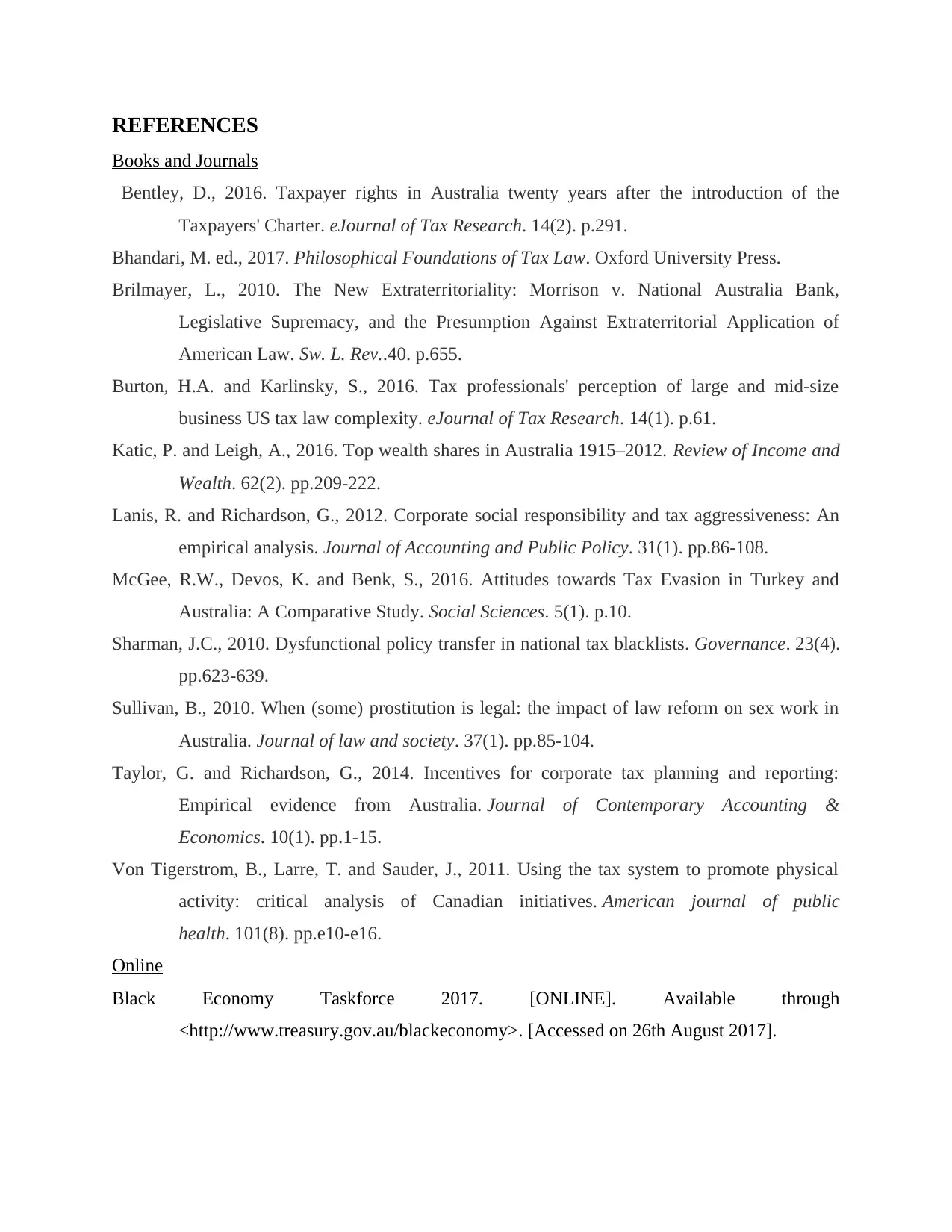
REFERENCES
Books and Journals
Bentley, D., 2016. Taxpayer rights in Australia twenty years after the introduction of the
Taxpayers' Charter. eJournal of Tax Research. 14(2). p.291.
Bhandari, M. ed., 2017. Philosophical Foundations of Tax Law. Oxford University Press.
Brilmayer, L., 2010. The New Extraterritoriality: Morrison v. National Australia Bank,
Legislative Supremacy, and the Presumption Against Extraterritorial Application of
American Law. Sw. L. Rev..40. p.655.
Burton, H.A. and Karlinsky, S., 2016. Tax professionals' perception of large and mid-size
business US tax law complexity. eJournal of Tax Research. 14(1). p.61.
Katic, P. and Leigh, A., 2016. Top wealth shares in Australia 1915–2012. Review of Income and
Wealth. 62(2). pp.209-222.
Lanis, R. and Richardson, G., 2012. Corporate social responsibility and tax aggressiveness: An
empirical analysis. Journal of Accounting and Public Policy. 31(1). pp.86-108.
McGee, R.W., Devos, K. and Benk, S., 2016. Attitudes towards Tax Evasion in Turkey and
Australia: A Comparative Study. Social Sciences. 5(1). p.10.
Sharman, J.C., 2010. Dysfunctional policy transfer in national tax blacklists. Governance. 23(4).
pp.623-639.
Sullivan, B., 2010. When (some) prostitution is legal: the impact of law reform on sex work in
Australia. Journal of law and society. 37(1). pp.85-104.
Taylor, G. and Richardson, G., 2014. Incentives for corporate tax planning and reporting:
Empirical evidence from Australia. Journal of Contemporary Accounting &
Economics. 10(1). pp.1-15.
Von Tigerstrom, B., Larre, T. and Sauder, J., 2011. Using the tax system to promote physical
activity: critical analysis of Canadian initiatives. American journal of public
health. 101(8). pp.e10-e16.
Online
Black Economy Taskforce 2017. [ONLINE]. Available through
<http://www.treasury.gov.au/blackeconomy>. [Accessed on 26th August 2017].
Books and Journals
Bentley, D., 2016. Taxpayer rights in Australia twenty years after the introduction of the
Taxpayers' Charter. eJournal of Tax Research. 14(2). p.291.
Bhandari, M. ed., 2017. Philosophical Foundations of Tax Law. Oxford University Press.
Brilmayer, L., 2010. The New Extraterritoriality: Morrison v. National Australia Bank,
Legislative Supremacy, and the Presumption Against Extraterritorial Application of
American Law. Sw. L. Rev..40. p.655.
Burton, H.A. and Karlinsky, S., 2016. Tax professionals' perception of large and mid-size
business US tax law complexity. eJournal of Tax Research. 14(1). p.61.
Katic, P. and Leigh, A., 2016. Top wealth shares in Australia 1915–2012. Review of Income and
Wealth. 62(2). pp.209-222.
Lanis, R. and Richardson, G., 2012. Corporate social responsibility and tax aggressiveness: An
empirical analysis. Journal of Accounting and Public Policy. 31(1). pp.86-108.
McGee, R.W., Devos, K. and Benk, S., 2016. Attitudes towards Tax Evasion in Turkey and
Australia: A Comparative Study. Social Sciences. 5(1). p.10.
Sharman, J.C., 2010. Dysfunctional policy transfer in national tax blacklists. Governance. 23(4).
pp.623-639.
Sullivan, B., 2010. When (some) prostitution is legal: the impact of law reform on sex work in
Australia. Journal of law and society. 37(1). pp.85-104.
Taylor, G. and Richardson, G., 2014. Incentives for corporate tax planning and reporting:
Empirical evidence from Australia. Journal of Contemporary Accounting &
Economics. 10(1). pp.1-15.
Von Tigerstrom, B., Larre, T. and Sauder, J., 2011. Using the tax system to promote physical
activity: critical analysis of Canadian initiatives. American journal of public
health. 101(8). pp.e10-e16.
Online
Black Economy Taskforce 2017. [ONLINE]. Available through
<http://www.treasury.gov.au/blackeconomy>. [Accessed on 26th August 2017].
⊘ This is a preview!⊘
Do you want full access?
Subscribe today to unlock all pages.

Trusted by 1+ million students worldwide
1 out of 9
Related Documents
Your All-in-One AI-Powered Toolkit for Academic Success.
+13062052269
info@desklib.com
Available 24*7 on WhatsApp / Email
![[object Object]](/_next/static/media/star-bottom.7253800d.svg)
Unlock your academic potential
Copyright © 2020–2025 A2Z Services. All Rights Reserved. Developed and managed by ZUCOL.





